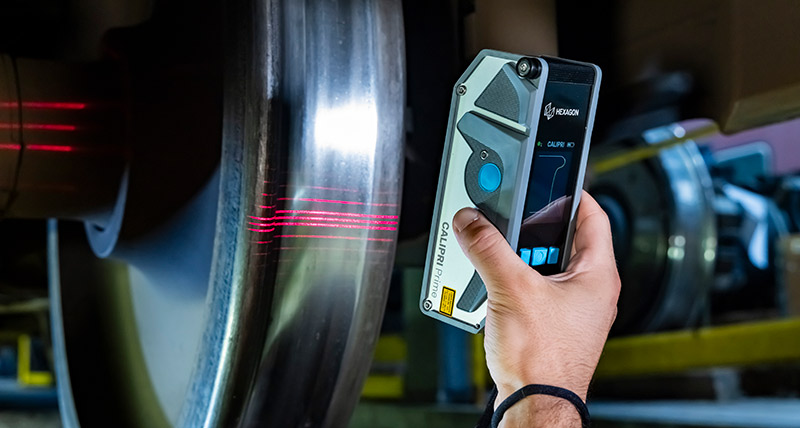Digitalisation of wheel profile measurement in rail freight transport
IGE relies on optical measurement technology from Hexagon to break new ground in wheel profile wear measurement
Contact us
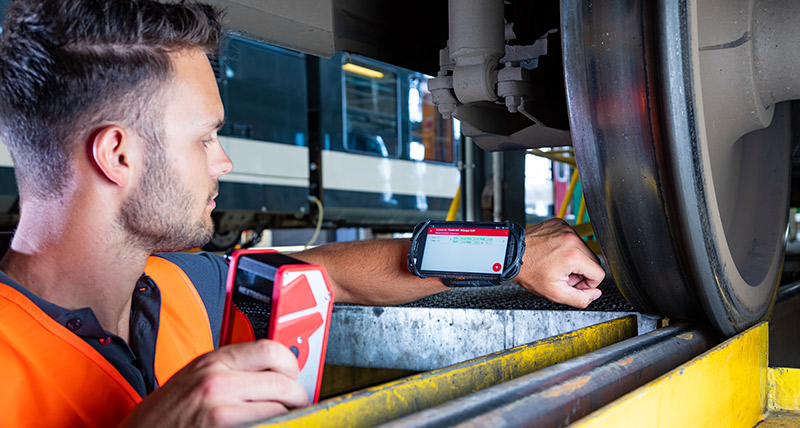
For more than 30 years, the name IGE has been a household name in the European railway scene, and now the Internationale Gesellschaft fur Eisenbahnverkehr is also one of the pioneers in modern analysis tools. Using optical measurement technology from NEXTSENSE, part of Hexagon’s Manufacturing Intelligence division, it is replacing outdated wheel profile measurement instruments with digital devices. User-independent measured values, more accurate results and operation at the touch of a button are a source of great enthusiasm among its employees.
As one of the few private rail transport companies in Germany, IGE offers a wide range of services in the rail sector. Whether goods transport, special transport or tourist nostalgia train journeys, the operator takes its guests and, above all, its goods wherever there are railways in Europe. Day in, day out, it must deal with numerous foreign wagons loaded to the brim over Europe’s rails. There is no question that the subject of security is crucial here.
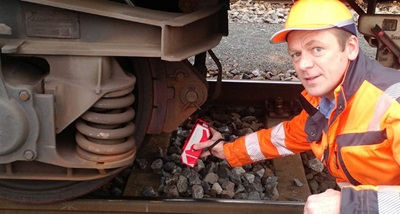 Each wagon is carefully inspected by trained wagon masters before departure, with particular attention paid to the wheels. The manual and visual inspection process takes two to three hours, depending on the length of the train and the condition of the wagons. Only wagons that pass this inspection will have their paperwork handed over to the train drivers before departure. If, however, there are defects of an operationally dangerous nature, the wagon will be shunted out of the formation and moved to a siding, and further action will be decided with the vehicle owner.
Each wagon is carefully inspected by trained wagon masters before departure, with particular attention paid to the wheels. The manual and visual inspection process takes two to three hours, depending on the length of the train and the condition of the wagons. Only wagons that pass this inspection will have their paperwork handed over to the train drivers before departure. If, however, there are defects of an operationally dangerous nature, the wagon will be shunted out of the formation and moved to a siding, and further action will be decided with the vehicle owner.
Stefan Garditz, railway operations manager at IGE responsible for vehicle safety, explains: “The quality of the wagons is already very high, but there is still a risk that a train may not leave because of a safety issue of some kind. We can only detect these defects and take the wagon out of service at an early stage if we carefully examine the wear and tear of the train wheels.”
Measurement of the wheel flange
Until recently, IGE checked the wear of individual train wheels manually with a calliper. A wagon master climbed under a wagon and placed the calliper on the wheel. As a rule, the wheel flange was measured, and in cases of doubt, an experienced wagon master could also determine the hollow tread of the running surfaces with the naked eye.
“However, this manual method carries the risk of getting different results depending on who carries out the measurement,” says Garditz. “Time pressure and incorrect handling when using the calliper are the two most frequent sources of error.”
This approach made the consistency and comparability of results almost impossible to achieve. In addition, manual measuring with the calliper involves physical strain that should not be ignored, especially for the older generation of wagon masters.
User-independent measurement results
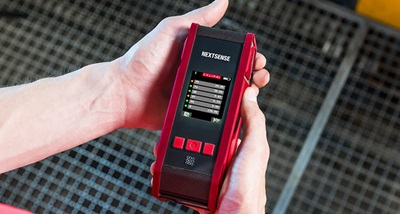 Dissatisfied with this situation, Garditz became aware of NEXTSENSE optical measuring instruments, which are based on a patented advanced development of laser light section technology. An algorithm corrects the tilting and twisting of the measuring device, resulting in obtaining the same measurement results regardless of the individual user.
Dissatisfied with this situation, Garditz became aware of NEXTSENSE optical measuring instruments, which are based on a patented advanced development of laser light section technology. An algorithm corrects the tilting and twisting of the measuring device, resulting in obtaining the same measurement results regardless of the individual user.
“I saw and tested NEXTSENSE measuring instruments for the first time at a trade fair. It was immediately clear to me that we needed something like this at IGE. It’s what I had been looking for,” says Garditz.
In particular, CALIPRI Prime, a laser-based handheld measuring device, guarantees user independent measured values in the micrometre range when testing wheel flange wear. Within a few seconds, the camera/laser unit in the measuring device records the key flange dimensions (height, thickness, qR size) of the wheelset. There is no need for any contact with the wheel, so there is no risk of ‘tilted contact’, as often found with conventional gauges.
Where needed, the wheel width, the hollow tread and rollover can also be determined, and limit value violations can be colour-coded. The measured variables are displayed on the device immediately after the inspection and are also made available for digital transfer to a computer.
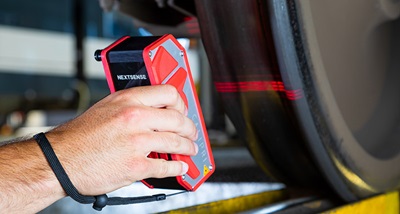 Introducing a digital measuring device and doing away with old methods met with no resistance among the workforce. “We haven’t had any acceptance problems; even our older colleagues received the device with enthusiasm. It’s simply a great relief, be it because of the fast measurement at the push of a button, the much higher accuracy or simply the physical relief of not having to climb under the vehicle anymore,” says Garditz.
Introducing a digital measuring device and doing away with old methods met with no resistance among the workforce. “We haven’t had any acceptance problems; even our older colleagues received the device with enthusiasm. It’s simply a great relief, be it because of the fast measurement at the push of a button, the much higher accuracy or simply the physical relief of not having to climb under the vehicle anymore,” says Garditz.
“But the best thing is that it even triggered a certain hunting instinct,” he laughs. “My colleagues are now using CALIPRI Prime to verify their own assessment of profile wear. They’re checking their own results. If the work is fun, then we’re definitely doing something right.”
Versatile fields of application
Even though the primary purpose is the random profile measurement of freight wagon wheelsets, IGE uses CALIPRI Prime in other beneficial ways, for example, in training courses for inspection staff. “There is always great amazement at the hundredths of a millimetre accurate measured values on the wheel flange,” says Garditz.
“Or on nostalgic train rides with historic rail vehicles: I recently had a case of a wobbling passenger wagon. So, I took the measuring device out of my pocket at the next station and inspected the wheel flange wear. In this way, we could quickly see that the wheels were fine, and the problem lay somewhere else,” says Garditz.
Paperless prospects
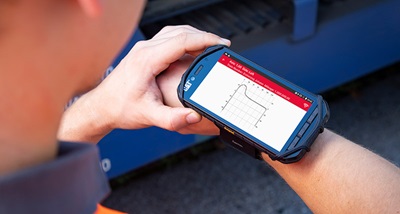 IGE, which is growing rapidly, has a clear goal: soon, each wagon master should be equipped with their own CALIPRI Prime device so that, in Garditz’s words, “the error-prone manual measuring” can be avoided altogether. This would be accompanied by the roll-out of paperless administration of the results. Instead, each wheelset would be assigned a barcode, and its individual measured values could be transmitted digitally to the vehicle owner immediately after measurement. Apart from saving considerable time, this would prevent many potential sources of error from arising in the first place.
IGE, which is growing rapidly, has a clear goal: soon, each wagon master should be equipped with their own CALIPRI Prime device so that, in Garditz’s words, “the error-prone manual measuring” can be avoided altogether. This would be accompanied by the roll-out of paperless administration of the results. Instead, each wheelset would be assigned a barcode, and its individual measured values could be transmitted digitally to the vehicle owner immediately after measurement. Apart from saving considerable time, this would prevent many potential sources of error from arising in the first place.
Hexagon shares this digital railway vision and has already developed a smartphone app from which a measurement plan can be compiled and updated. In real-time, vehicle inspectors can also enter data for identifying the vehicle, axle and wheel from the trackside.
Looking at product developments at Hexagon, his vision may soon become a reality. The company is already working on various software solutions to make handwritten documentation superfluous. Measurement plans can already be managed today with an app and smartphone, and data for identifying the vehicle, axle and wheel can be entered directly on the track.
